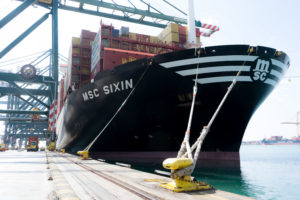
A total of 11 refrigerated containers have been loaded from the quays of the Valenciaport which arrived from the Port of Castellón.
The world economic situation is causing the concentration of maritime traffic and large capacity container ships in strategic ports such as València.
The Port of València, which operates these large container ships, guarantees competitiveness and efficiency for exporting companies with the world’s main markets.
11 refrigerated containers loaded with 250 tonnes of oranges from Castellón leave the Port of Valencia on board the MSC SIXIN, one of the largest container ships in the world with a capacity of 23,756 TEU (standard 20-foot container), bound for India. An experimental shipment coordinated by the Citrus Management Committee (CGC) which opens an opportunity for the sector to gain a foothold in a market as powerful as the Indian one.
Citrus fruit from the Valencia Region, the result of collaboration between the ports of Valencia and Castellón, on board the largest capacity ship that has ever docked at the port facilities in Valencia – its first call was in June 2020 – with a capacity of 23,756 TEU, making it the second largest container ship in the world. More efficient, sustainable and digital ships that favour the movement of goods between Europe and the Far East. The arrival of this type of ship is made possible by the improvement of the drafts in the Príncipe Felipe dock in 2019 to adapt it to container ships of these characteristics. A commitment for Valenciaport to continue to be a strategic hub in the Mediterranean and a port of reference for Spanish export companies that sell their products to any corner of the world.
An example of this operational importance of large ships is that in the first four months of the year, the movement of goods in the Valencian port area grew by 9.54% and that of containers by 6.5%, while the number of ships arriving at the Valencian docks fell by 2.23%. Something which was already reflected in 2020 when 1,040 fewer ships arrived at the port of Valencia than in 2019, a decrease of 13.2%. The world economic situation is producing and accelerating the concentration of the loading/unloading of goods and the fact that there are fewer and fewer hub ports such as València.
In recent years, shipping companies have been opting for ships with greater capacity, which are more efficient and sustainable. The MSC SIXIN, belonging to Mediterranean Shipping Company (MSC), is an example of this commitment to the present and future of maritime transport. This container ship was inaugurated in 2019 and is equipped with the latest technological advances in maritime transport, where environmental criteria are prioritised. It is part of the “MSC GÜLSÜN” class with a capacity of 23,756 TEU, 400 metres long and 61 metres wide. The MSC SIXIN has the telematic connection of the “digital containers”, has more than 2,000 connections for refrigerated TEUs and a design that allows a significant reduction of CO2 per container transported with respect to the average of the container ships operating today. Specifically, this container ship operates the Jade shipping service linking Asia and Europe.
These high-capacity ships ensure connectivity with Asian markets, guaranteeing lower costs for exporters who can use these services directly, which improves the competitiveness of the productive fabric of the Valencia Region to reach the markets of the Far East and all the intermediate ports on this route, as in the case of the oranges that have left for India.
Valenciaport, strategic for the agri-food industry
In the first four months of the year, Valenciaport’s docks handled the entry and exit of 2,937,518 tonnes of products from the agri-food and livestock sector, 11.57% more than in the same period in 2020. Of this total, 51.4%, i.e. 1,502,123 tonnes, corresponds to sales abroad by Spanish industry to different parts of the world. This figure represents an increase of more than 35% compared to the first four months of 2020 and is a sign of the dynamism of the agri-food sector, which has in Valenciaport the strategic port of entry and exit of its goods.
Valenciaport is a fundamental port for the industry that confirms year after year the port community’s commitment to provide the necessary services and instruments to facilitate the movement of both non-perishable and perishable agri-food products. In the latter case, refrigerated maritime transport is carried out in reefer containers, which are equipped with a refrigerated engine that allows the transport of temperature-sensitive goods such as fruit, vegetables, fish or meat, but also other products such as chemicals or pharmaceuticals.
In addition, another of the strong points of the Port of València is its position as the best connected Spanish port, fourth in Europe and twentieth in the world according to the index drawn up by the United Nations Conference on Trade and Development (UNCTAD). The Valencian port maintains commercial relations with a thousand ports in 168 different countries, and operates 98 regular lines managed by 35 different shipping companies.
First major shipment to India
These 11 refrigerated containers are the first experimental shipment of Spanish oranges destined for India and form part of a joint action promoted, led and coordinated by the Citrus Management Committee (CGC), in which 10 operators have participated and which has been supported by the Regional Ministry of Agriculture, Rural Development, Climate Emergency and Ecological Transition. These containers have been sent in viable conditions in which the cold treatment required in pre-shipment has been replaced by another in transit.

